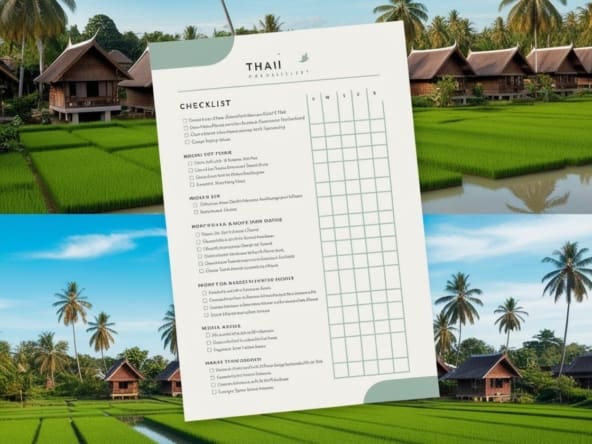Investing in real estate in Thailand can be an exciting venture, especially for those looking to build their dream home or develop commercial projects. However, buying land in Thailand is not as straightforward as purchasing a built property, particularly for foreign buyers. This comprehensive guide will explore the essential nuances of buying land in Thailand, covering the legal framework, key considerations, and practical tips for a successful transaction.
Understanding Land Ownership in Thailand
The first step in buying land in Thailand involves understanding the rules governing land ownership, which differ for Thai nationals and foreigners.
1. Thai Nationals
Thai citizens enjoy the ability to purchase land outright. They can hold the title in their name without any restrictions. This ownership grants them full rights over the land, allowing for sale, lease, or development without interference.
2. Foreign Nationals
For foreign buyers, the situation is more complex. According to the Thai Land Code, non-Thai nationals cannot own land directly. Fortunately, several alternatives exist for those interested in buying land in Thailand:
- Long-Term Lease: Foreigners can lease land for up to 30 years, with options for two additional 30-year extensions. This arrangement provides long-term security for those wishing to reside or invest in Thailand.
- Thai Company Ownership: Another option involves establishing a Thai limited company, where foreigners may hold up to 49% of the shares. The company can then purchase land in its name. Careful planning and adherence to Thai laws are crucial to avoid legal complications.
- Ownership through a Thai Spouse: Foreigners married to Thai nationals can buy land under their spouse’s name. However, this requires detailed documentation and legal agreements to protect both parties’ interests.
Freehold vs. Leasehold
When buying land in Thailand, it’s essential to understand the difference between freehold and leasehold ownership:
- Freehold Ownership: This type of ownership allows the holder full rights to the land. However, it is generally only available to Thai nationals. Foreigners can indirectly achieve freehold-like rights through a Thai company structure or by marrying a Thai citizen. Freehold ownership provides more security and control over the property.
- Leasehold Ownership: Foreigners often opt for leasehold agreements, allowing them to lease land for extended periods—typically up to 30 years with renewal options. This type of ownership does not confer ownership rights in the same way as freehold. Instead, leaseholders have the right to use and develop the land according to the lease terms. While leasehold can be a practical option, it’s essential to carefully review lease agreements, as they must be registered with the local Land Office to be enforceable.
Key Legal Documents
Familiarizing yourself with important legal documents is essential before proceeding with buying land in Thailand:
- Title Deeds: The title deed (Chanote) represents the most secure form of land ownership in Thailand. Confirm that the land has a clear title deed, indicating it is free from encumbrances.
- Land Office Registration: All transactions must be officially registered at the local Land Office. This step is vital for formalizing ownership and safeguarding your rights.
Key Considerations When Buying Land
Several important considerations arise when buying land in Thailand. Here are the key factors to keep in mind:
1. Due Diligence
Conducting thorough due diligence is critical before making any commitments when buying land in Thailand:
- Title Deed Verification: Verify that the land has a clear title deed and is free from encumbrances such as mortgages or liens. The local Land Office can assist in this verification process.
- Land Use Regulations: Investigate local zoning laws to understand what can and cannot be built on the land. This research is especially important for commercial properties or residential developments, as zoning laws vary significantly.
- Boundary Surveys: A boundary survey is essential to confirm the exact size and limits of the property. This helps avoid disputes with neighbors and ensures that you are purchasing the correct land.
2. Understanding Costs
Beyond the purchase price, buying land in Thailand involves various additional costs. Be prepared for the following expenses:
- Transfer Fees: Typically, the transfer fee is 2% of the appraised value of the land, payable at the local Land Office.
- Stamp Duty: Charged at 0.5% of the appraised value or sale price, whichever is higher. This fee is an important aspect of the financial planning process.
- Legal Fees: Engaging a qualified attorney to navigate the purchase can cost around 1-2% of the purchase price. This investment is worthwhile to ensure compliance with all legal requirements and to protect your interests.
- Maintenance and Development Costs: If you’re purchasing raw land, consider the costs associated with development, including permits, construction, and utility installations.
3. Negotiating the Purchase Agreement
A well-drafted purchase agreement is essential for a successful transaction when buying land in Thailand. Key elements to include are:
- Purchase Price: Clearly state the agreed price and payment terms to avoid misunderstandings later on.
- Deposit: Outline the amount of the deposit and the conditions for its return if the sale does not proceed as planned.
- Timeline: Specify the timeline for the transfer of ownership and any construction milestones that need to be met.
- Contingencies: Include contingencies that must be fulfilled before finalizing the sale, such as securing financing or obtaining government approvals.
4. Local Insights
Understanding local market dynamics can provide a significant advantage when buying land in Thailand. Research trends in land prices and ongoing development projects in the area. For example, regions around Bangkok, Phuket, and Chiang Mai have seen considerable appreciation in land values due to ongoing infrastructure improvements and increased demand for residential properties.
Comparing Land Purchases with Built Properties
When considering an investment in Thailand, you may weigh the pros and cons of buying land in Thailand versus built properties. Here’s a detailed comparison to help you decide:
Advantages of Buying Land
- Customization: Purchasing land gives you the freedom to build a property that meets your specific needs and preferences. This option is particularly appealing for buyers looking to design their ideal home or commercial space.
- Potential for Appreciation: Land values in developing areas can rise significantly over time, offering solid returns on investment. For instance, in regions experiencing infrastructure development, land prices have risen by an average of 10-15% annually.
- Fewer Maintenance Issues: With raw land, you avoid the immediate maintenance concerns that often accompany existing structures. This can lead to lower ongoing costs in the early years of ownership.
Disadvantages of Buying Land
- Complex Legal Framework: Navigating land ownership regulations can be challenging for foreign buyers, necessitating a thorough understanding of the legal landscape.
- Development Costs: Building on land involves additional expenses, such as construction, permits, and landscaping. These costs can quickly accumulate, so budgeting is essential.
- Longer Time Frame: The process of acquiring land and constructing a property can take significantly longer than purchasing an existing home. Depending on the complexity of the project, completion may take several months to years.
Advantages of Buying Built Properties
- Immediate Use: When you purchase a built property, you gain immediate use and potential rental income, which can start generating cash flow right away.
- Simpler Process: The transaction process for existing properties is often more straightforward than for land. Buyers can more easily review property histories, appraisals, and other pertinent information.
- Established Community: Buying in a developed area grants access to established amenities, services, and infrastructure, enhancing your overall quality of life.
Disadvantages of Buying Built Properties
- Limited Customization: Existing properties may not fully meet your needs or preferences, which might necessitate renovations or adjustments.
- Maintenance Responsibilities: Older properties may require significant maintenance or repairs, leading to additional ongoing costs. This is especially true for properties with deferred maintenance issues.
- Market Variability: The value of built properties can fluctuate significantly based on market conditions, neighborhood desirability, and broader economic trends.
Historic Examples of Real Estate Growth
Examining Thailand’s real estate market history reveals significant transformations that offer valuable insights for today’s investors interested in buying land in Thailand.
The 1997 Asian Financial Crisis
The 1997 Asian Financial Crisis had a profound impact on Thailand’s property market, leading to a sharp decline in land prices. However, the market exhibited resilience, eventually recovering and showcasing substantial growth. Notably, areas such as Sukhumvit and Silom in Bangkok evolved from traditional business districts into vibrant residential and commercial hubs, attracting significant foreign investment in the years that followed.
The Rise of Phuket and Krabi
In the early 2000s, the emergence of low-cost airlines made previously remote areas like Phuket and Krabi accessible to international travelers. This development sparked a real estate boom in these regions. The influx of tourists and expatriates resulted in heightened demand for resorts, villas, and condominiums, fundamentally transforming the landscape. Today, Phuket remains one of the most sought-after destinations for both tourists and real estate investors.
Conclusion
Buying land in Thailand presents unique opportunities but also comes with challenges, particularly for foreign investors. By understanding the legal framework, conducting thorough due diligence, and carefully considering your options, you can ensure a successful transaction. Whether you choose to build your dream home or develop a commercial project, being informed is crucial for making sound investment decisions in this vibrant market.
Call to Action
If you’re considering buying land in Thailand, consult with a local real estate expert and legal advisor. Their guidance will help you navigate the complexities of the process, ensuring a smooth and successful land acquisition experience. Investing in land can be a rewarding endeavor, offering the potential for significant returns and the fulfillment of your vision in one of Southeast Asia’s most captivating countries.



